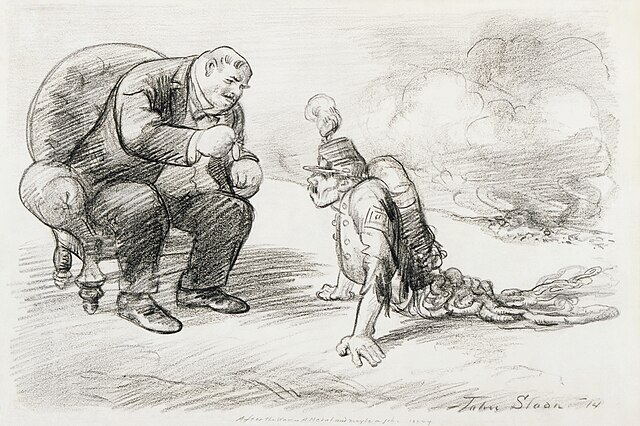Welcome to the Moment of Truth: the thirst that is the drink.
Among the trees swarm at least 122 distinctly different species of bat, each unique to the Red Forest on the Fat Island of Langostan, in the Middle Seasoning A Capellago. Hardly anyone ever goes there other than bat enthusiasts, professional and amateur, because of the great confusion. But no bat has yet been denied into one or another official taxonomic slot, so it's unclear what is so bewildering. Maybe it's the sheer number of species in so limited a space, no one knows how limited. In any case, the climate is both tropical and sub-tropical, and extremely humid.
Two main genera of bats comprise the numerous species, all but two (of those two exceptions later). These two grand groups are the bug-eaters, which echo-locate, and the fruit-eaters, which do not. The bug-eaters tend to be smaller than the fruit-eaters. Bug- eaters have been known to eat birds on occasion. Particularly vulnerable to predation is the typeface hummingbird, which is the size and shape of an 18-point Times New Roman comma, and the smallest hummingbird known. They only exist in the Red Forest. Happily, they are a prolific species, and swarm in their thousands among the apricot shrubs like minnows amidst seaweed.
Among the bug-eaters are the orchid-nosed bat, the bee bat, the tissue bat, and the glass- eared bat. Each species echo-locates at a unique frequency, in one of the musical modes, frequently Mixolydian.
The fruit-eating bats, or dog-faced bats, seem to be descended from the early wild gliding foxes of Pan-Asia, however they are no relation, except in the very distant sense that all mammals are. As stated above, these bats are neither able nor inclined to echo-locate. They just look around with their eyes. As they are nocturnal, they often bump into things.
While the bug-eaters range in size from that of a bumble-bee to that of a robin, the fruit- eaters are much larger, the largest, the schnauzer dragon, known to possess a wingspan of upwards of eight feet.
The indigo umbrella monkey is of more manageable proportions, meaning it can be fit conveniently into an overnight train case, although one should expect it to be displeased with the experience. The indigo umbrella is one of the above-mentioned species falling neither into one major genera nor the other. It eats both insects and fruit, as well as birds, roots, tree bark, fungi, cheese, small prey animals, snakes,... read more
In 1940 – (78 years ago) – an earthquake in the Vrancea region of eastern Romania wreaked havoc from the capital city of Bucharest well into neighboring Moldavia (now known as Moldova). In Bucharest, some 185 buildings were destroyed, including a fourteen-story reinforced concrete structure that was the city’s tallest building. From across the country came reports of fire, landslides, burst pipelines, leveled neighborhoods, and collapsed factories. The death toll was placed at almost 600, with another 1,271 people injured in Romania’s worst earthquake of the twentieth century.
In 1944 – (74 years ago) – at Port Seeadler in the Admiralty Islands of Papua New Guinea, the US Navy cargo ship Mount Hood exploded without warning, with almost four thousand tons of explosives and ammunition aboard. The ship had been delivering munitions to Navy vessels in the South Pacific theater of World War II. Eyewitnesses reported a sudden blast and mushroom cloud, followed by chunks of mud, metal debris, and body parts raining from the sky. The explosion completely destroyed the Mount Hood and killed all 350 of its crewmembers, of whom no physical remains were ever positively identified. It also damaged some twenty-two smaller craft nearby in the harbor, many of whose crewmembers were also killed. Years later, the blast would be assessed as equivalent to that of a small tactical nuclear weapon. It was so powerful that it blew a hole in the ocean floor directly below the ship, measuring a hundred yards long, fifty feet wide, and forty feet deep. Altogether at least 432 people died, with 371 wounded. A naval inquiry later attributed the accident to poor handling of ammunition.
In 1975 – (43 years ago) the iron ore freighter SS Edmund Fitzgerald, largest ship on the Great Lakes, ran into violent weather on Lake Superior, some seventeen miles north of Whitefish Point in Michigan’s Upper Peninsula. The ship was buffeted by hundred-mile-an-hour winds, with waves up to thirty-five feet high. Its captain, Ernest McSorley, was on his last voyage before retirement. Just after 7 p.m. he radioed to another freighter nearby, the SS Arthur M. Anderson, that although his vessel was taking on water, he and the crew were holding their own in the storm. It was the last communication from the Edmund Fitzgerald. Without even sending out a distress signal, the ship went to the bottom of... read more
Listen live from 9AM - 1:30PM Central on WNUR 89.3FM / stream at www.thisishell.com / subscribe to the podcast
9:20 - Activist Andrew Dobbs explains why workers and the poor lose every election - including this one.
Andrew wrote the article No, Voting Democrat is Not “Harm Reduction” at Medium.
10:05 - Writer Pavlos Roufos reviews eight years of disaster for Greece under Europe's austerity regime.
Pavlos is author of the book A Happy Future is a Thing of the Past: The Greek Crisis and Other Disasters from Reaktion Books [UK] / University of Chicago Press [US]
11:05 - Organizer Tom Hansen explores the future of socialism and the state under Cuba's new constitution.
Tom wrote the article Challenges for Cuba's New Constitution for the Mexico Solidarity Network's website.
12:00 - Researcher Anna Pigott exposes the engine powering the Anthropocene - it's capitalism, not us.
Anna Pigott wrote the article Capitalism is killing the world’s wildlife populations, not ‘humanity’ for The Conversation.
12:40 - In a Moment of Truth, Jeff Dorchen goes - and possibly stays - bats.
Jeff told me he's gonna do a cuss towards the end of this one, so hopefully the dump button works or no one is listening.
1:00 - Political scientist Leah Stokes examines the wide ideological gap between Congress and US citizens
Leah is co-author of the paper Legislative Staff and Representation in Congress in the American Political Science Review.
Listen live from 9AM - 11AM Central at www.thisishell.com / subscribe to the podcast
9:20 - Black Agenda Report's Glen Ford explores the politics of race and class under a corporate duopoloy.
Glen wrote the article The Great Un-Blackening: The Corporate Project to Erase Black People from Politics for Black Agenda Report.
10:00 - Investigative journalist Greg Palast explains how Georgia's election was stolen before anyone voted.
Greg posted the video How to Steal Georgia in 7 Minutes for Salon.
10:45 - In a Moment of Truth, Jeff Dorchen does the Tarantella all by himself.
I looked up what that meant, not super up on Italian folk dance traditions.
Listen live from 9AM - 10AM Central on WNUR 89.3FM / stream at www.thisishell.com / subscribe to the podcast
9:05 - Live from São Paulo, Brian Mier reports on Brazil's election at the edge of fascism.
Brian translated the recent articles Bolsonaro and the Institutionalization of Necropolitics and International Interests and the destruction of Brazilian Democracy for New Socialist.
9:25 - Journalist Tina Vasquez reports on the work of making #AbolishICE a reality.
Tina wrote the article Abolish ICE: Beyond a Slogan for Rewire.News and New York Review Daily.
Listen live from 9AM - 10AM Central on WNUR 89.3FM / stream at www.thisishell.com / subscribe to the podcast
9:05 - Writer Brendan O'Connor profiles the Proud, White face of ruling class violence in America.
Brendan wrote the article Boys to Men for The Baffler.
9:35 - Writer Malaika Jabali explores politics in a Black, Midwestern city abandoned by the Democratic Party.
Malaika wrote the article The Color of Economic Anxiety for Current Affairs.








